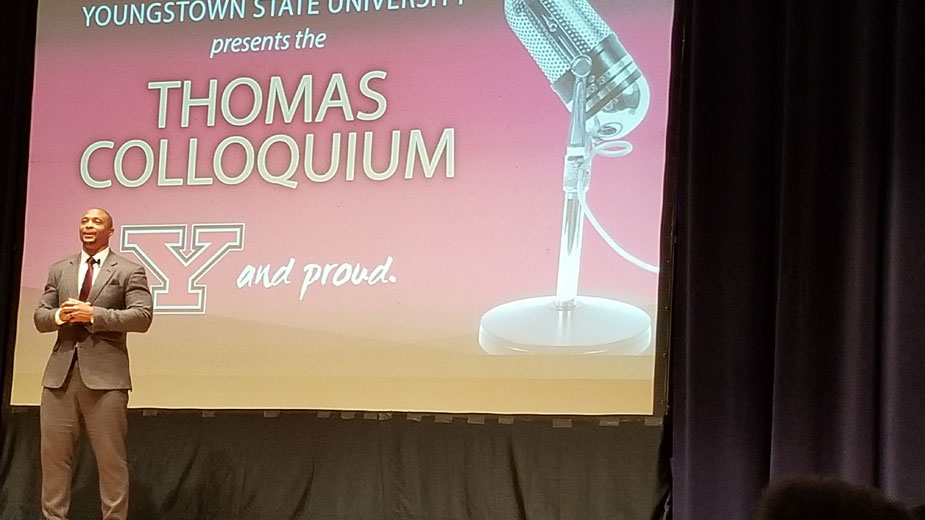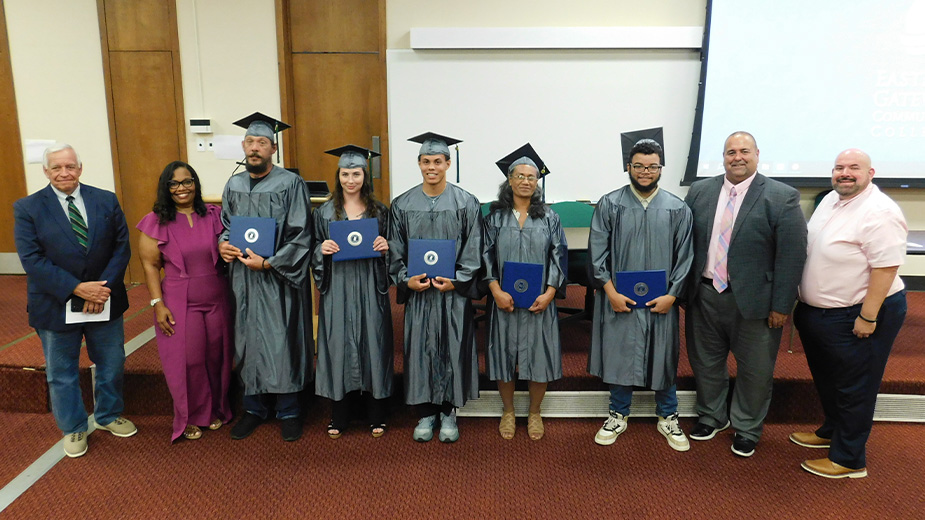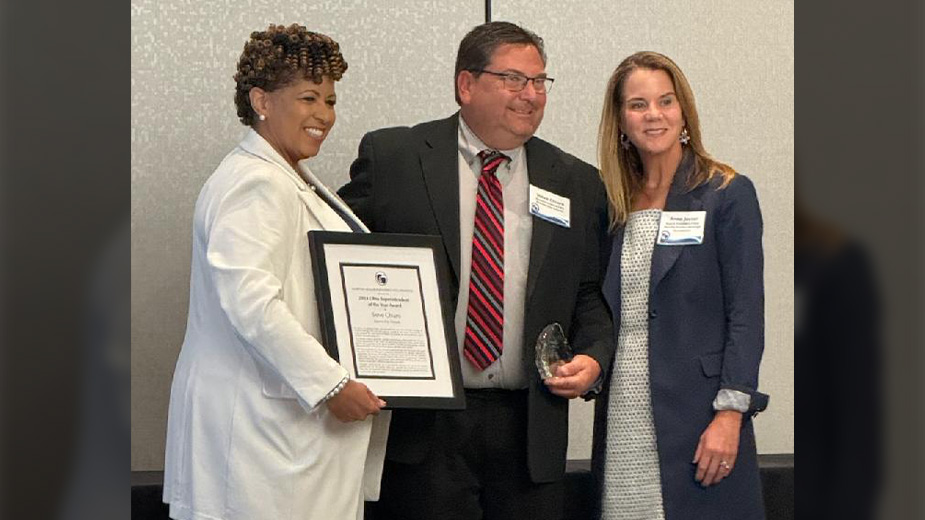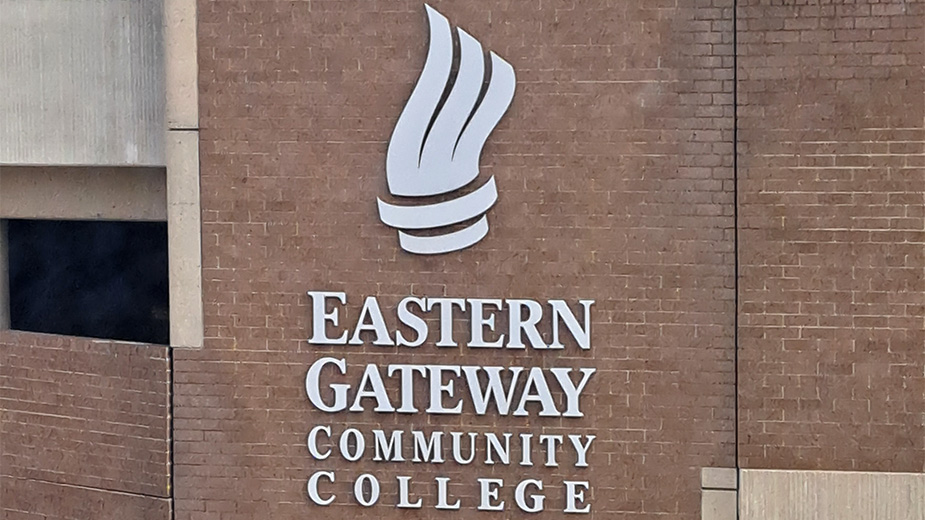Eddie George Tells YSU Audience to ‘Feed Your Spirit’
By Pat Springer YOUNGSTOWN, Ohio — His journey, while highly improbable, is nonetheless true. Identifying what he called his four pillars for a productive and successful life, NFL All Pro running back Eddie George spoke to an audience of business and sports fans last night as the featured guest of the Thomas Colloquium at Youngstown State University. Referred to by YSU President Jim Tressel in his introduction as “a renaissance man,” George has overcome the odds, battling a life on the streets of Philadelphia and a less than stellar high school academic career, to become not only the Heisman Trophy winner at The Ohio State University but also a theater actor and professor at his alma mater. His success has taken him from the horseshoe in Columbus to the bright lights of Broadway and to the classrooms of the Kellogg School of Management at Northwestern University. Identifying these four pillars of mental toughness, physical well-being, social interaction, and spiritual beliefs, George wove them throughout his talk with humor and insight, describing the ups and downs of a life unexpected but one very much appreciated. Growing up in Philadelphia, he shared that his father used to say that under the lights on the football field is where the magic happened, mentioning great running backs such as Jim Brown, Barry Sanders, and OJ Simpson. George wanted nothing more than to be one of them, hoping it would win his father’s love and make him proud. “My mother was the engine. My father was the spirit,” George said. A youth facing obstacles followed. His parents divorced, his father lived a life on the streets using drugs, and George found himself about to be held back in the 12th grade with a 1.2 GPA. “And I was proud of that,” he said to audience laughter. “My goal was to get into college but my behavior didn’t reflect that.” In an effort to straighten out his life, his mother sent him to Fork Union Military Academy in Virginia, where he spent three years. Learning a new lifestyle was difficult at first, he explained, but after he saw coaches from numerous universities come through the school and the possible opportunities, George shifted his thinking. Still, at the end of his second year, George, despite rushing for over 1,000 yards and earning All-State honors, received no offers of college scholarships. So he returned for a post-graduate third year, rushing for 1,300 yards and 22 touchdowns. Recruited by The Ohio State University, George became a record-setting running back yet felt the pain of the highs and lows of collegiate athletics. After a breakout game against Syracuse on national television when he scored three touchdowns, George was showered with perks and praise until later in the season when he fumbled twice during a game against Illinois. The tide turned. The fickleness of the fans burned him. They called him the worst running back ever at Ohio State. George’s thoughts turned to transferring, but he admitted that deep in his spirit something was telling him to see it through. The experience became a defining moment. “Those fumbles against Illinois – that’s when I won the Heisman. That’s when I fought,” George declared. A nine-year career in the NFL, achieving all-pro status, followed. Drafted by the Tennessee Titans, George said that the first three years were terrible. The franchise, which had been the Houston Oilers, couldn’t give tickets away. But after its 1999 Super Bowl run, losing to the St. Louis Rams, 23-16, on a last-second goal-line tackle, the business reality of the NFL hit him. George was 31, making $8.2 million a year and was cut from the roster. He spent his final year in Dallas under Coach Bill Parcells. Demoted to the scout team and goal-line running back, he was embarrassed by Parcells when he forgot a play. Parcells screamed at him to get off the field. He left and received no other football offers. Fear anxiety and doubt crept in. “I was lost. I became bitter. I couldn’t get a good night’s sleep. I wondered what my life’s purpose was,” George said. He resorted to taking one Ambien with a glass of wine, then one and a half Ambien with wine, and then three Ambien until one night he passed out. He then sought counseling. As a result, identifying the Three E’s – Entrepreneurship, Entertainment, and Education – moved him forward. His wealth management ventures helped launch his entrepreneurship and today, as a professor at Ohio State, George teaches student athletes how to succeed and grow their brand before, during and after the game. Leveraging his position as a television commentator to nine years in an acting classroom led him to the Broadway stage and a starring role as Billy Flynn in the hit musical “Chicago.” He has also performed the works of Shakespeare (Othello) and Lorraine Hansberry (A Raisin in the Sun). Earning an MBA in 2010 from the Kellogg School of Management at Northwestern University solidified his focus on education. Throughout all these experiences, George admitted that he had to step out of his comfort zone and continue to evolve. When asked how he finds time to sleep – to be a family man – George elaborated on those pillars that form his foundation. “My voice is loudest and clear when I’m by myself, when I’m quiet.” he stated, citing the need to be in good physical shape, which allows him to stretch his mind when facing adversity. A supportive social network of friends who sharpen the minds of each other, who are smarter and more experienced than he, is also a crucial factor. “Your network equals your net worth,” he observed. George ended by saying everyone has two dates in their lives – the date we’re born and the date we die. In between is a dash that is the measure of your life. “Tap into something that feeds your spirit,” he urged. “When you have all four pillars in alignment, there’s not a storm you can’t handle.”Copyright 2024 The Business Journal, Youngstown, Ohio.



